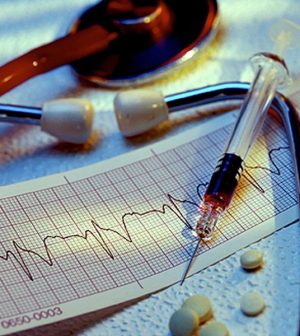- Could Your Grocery Store Meat Be Causing Recurring UTIs?
- Are You Making This Expensive Thermostat Error This Winter?
- Recognizing the Signs of Hypothyroidism
- 10 Strategies to Overcome Insomnia
- Could Artificial Sweeteners Be Aging the Brain Faster?
- Techniques for Soothing Your Nervous System
- Does the Water in Your House Smell Funny? Here’s Why
- Can a Daily Dose of Apple Cider Vinegar Actually Aid Weight Loss?
- 6 Health Beverages That Can Actually Spike Your Blood Sugar
- Treatment Options for Social Anxiety Disorder
Could Newborn Heart Stem Cells Jump-Start Old Hearts?

Stem cells from young hearts might breathe new life into aging ones, research in rats suggests.
In the study, a special type of stem cells was taken from the hearts of newborn rats and injected into the hearts of old rats, average age 22 months. Other rats from the same age group were given saline shots instead.
Baseline heart function was measured in all the rats, using echocardiograms, treadmill stress tests and blood analysis. The group of older rats underwent an additional round of testing one month after receiving the stem cells from the hearts of the young rats.
The old rats who were given stem cells showed better heart function, a 20 percent increase in exercise capacity and, oddly enough, an improved ability to regrow hair.
“Our previous lab studies and human clinical trials have shown promise in treating heart failure using cardiac [heart] stem cell infusions,” said co-primary investigator Dr. Eduardo Marban, director of the Cedars-Sinai Medical Center Heart Institute in Los Angeles.
“Now we find that these specialized stem cells could turn out to reverse problems associated with aging of the heart,” he said in an institute news release.
“The way the cells work to reverse aging is fascinating,” Marban added. “They secrete tiny vesicles that are chock-full of signaling molecules such as RNA and proteins. The vesicles from young cells appear to contain all the needed instructions to turn back the clock.”
But more research is needed, the investigators said.
“This study didn’t measure whether receiving the [specialized] cells extended life spans, so we have a lot more work to do,” added co-primary investigator Dr. Lilian Grigorian-Shamagian. She is a postdoctoral researcher at Cedars-Sinai.
“We have much to study, including whether [heart stem cells] need to come from a young donor to have the same rejuvenating effects,” Grigorian-Shamagian explained.
The findings were published Aug. 14 in the European Heart Journal.
More information
The U.S. National Heart, Lung, and Blood Institute offers a guide to a healthy heart.
Source: HealthDay
Copyright © 2026 HealthDay. All rights reserved.










